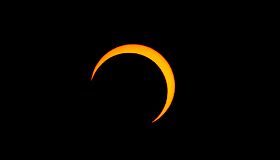
On Friday the 20th March, at 8.45am, just as most of us are making our way to work or school, a major eclipse of the sun will begin. For the UK, this will be a partial eclipse, but most of us will see the sky darken, as the moon covers as much as 98% of the sun.
A solar eclipse happens when the Moon's orbit lines up between the Sun and the Earth, causing the Moon to block out the Sun's light for a short time. It's quite rare, and can only happen when the Moon is an exact distance from the Earth. The last Solar eclipse of this scale was in 1999.
The North of Scotland will experience a 98% of the partial eclipse, Southern Scotland and Northern Ireland will experience a 95% partial solar eclipse, for Northern England, Wales, the Midlands and Northern coastal areas of Cornwall it will be a 90% eclipse, and for the rest of Southern England the Sun will be around 85% covered by the Moon.
Great info graphic showing showing how much of this Fridays eclipse you are likely to see.pic.twitter.com/hhqn8ArRFY
— Weather Forecast (@uk_forecast) March 18, 2015
Cloud
Sadly, it looks as though it will be a very cloudy start to Friday morning, and for most of us this may obstruct our view of the eclipse. For many, it is likely to get somewhat darker for a short while, but the sun may not be visible.
Currently it looks as though the best chance of a view of the eclipse is in Wales, the Midlands and parts of the south west, particularly North Cornwall.
Safety
It's very important that you do not look directly at the Sun during Fridays eclipse, to do so could seriously damage your eyes or even cause you to go blind. Instead, there are a few other ways you can watch Fridays eclipse.
Firstly, from 9am on Friday, BBC1 will be showing the eclipse live on TV. This is by far the safest (and warmest) way to view the eclipse.
You could create your own Pinhole projector, using two pieces of paper or card, as shown in the drawing below.
Or you could purchase a pair of Solar Eclipse glasses, but beware, as demand for these rises in the run up to this event, some glasses are being sold at hugely inflated prices, and some may not even be safe to use. Make sure your Solar Eclipse glasses carry the CE mark, meaning that they’ve been approved and meet the requirements of the EU. Do not be tempted to use normal sun glasses, because these do not filter out harmful UV light.
For regular updates visit our Facebook page, click the 'Like' button and then click the 'Follow' button. Updates will then appear in your Facebook news feed.